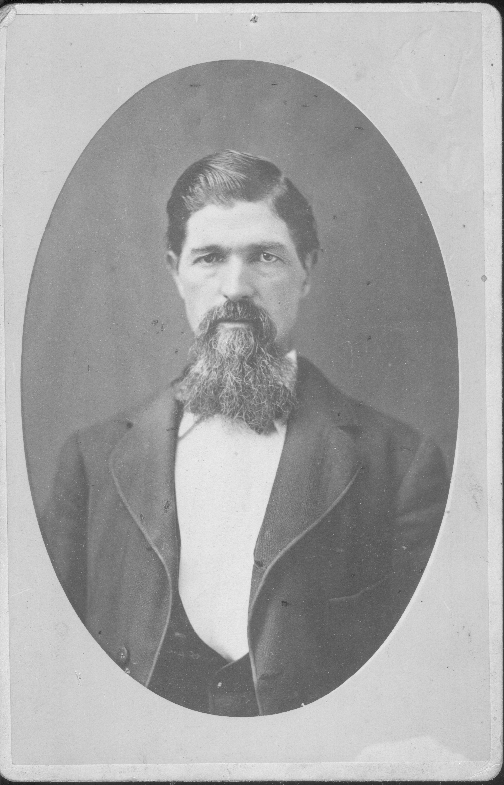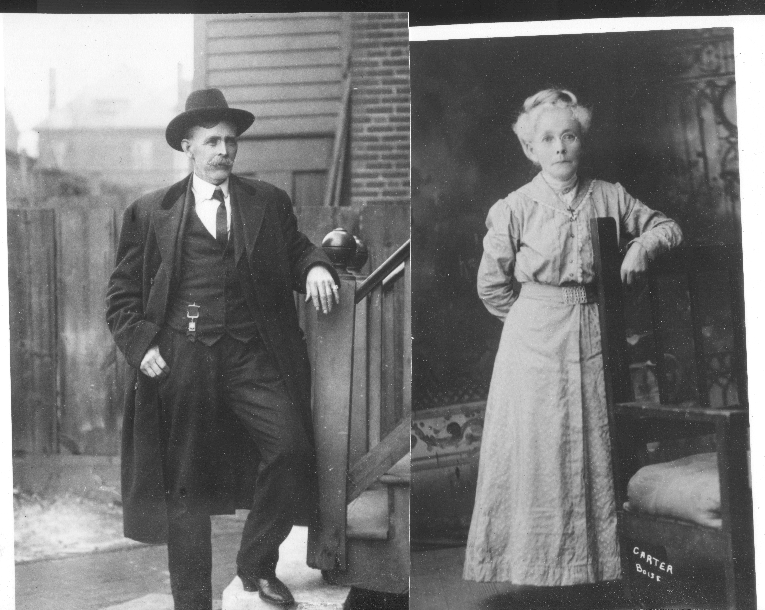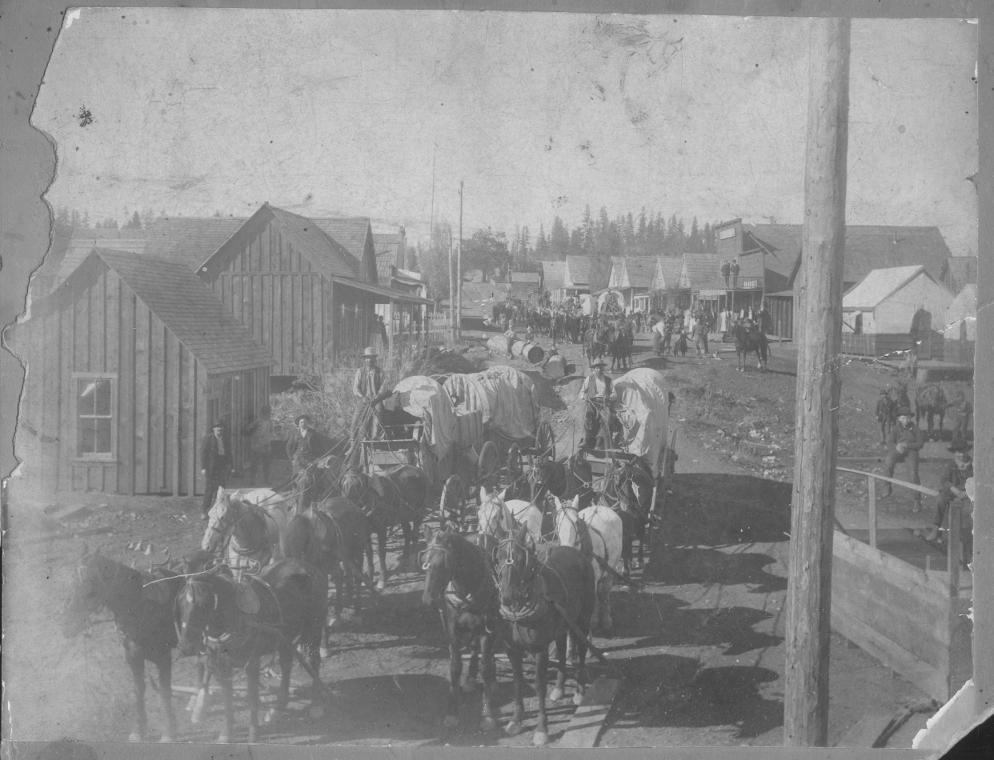A week or two ago, we were talking about the new version of the movie True Grit and the talk turned to the sort of language that folks used at the time. I've finally dug out several old family letters from the time and I thought that I'd post one of them here to give a taste of what was on their minds back then, and how they expressed it. Here goes...this is a letter William Cooper his brother (and my great great great grandfather) Christopher Cooper. Christopher lived in St. Joseph, MO and William was mining at Sailor Diggins, CA.
It's interesting that the topic of the letter is a little familiar: work is hard and nobody ever writes!
Sailor Diggins, Cal. March 3rd, 1853
Dear Brother Chris,
I write this not knowing when I will get a chance to send it - (as I have done many others). I have been living in rather an out of the away place out here to receive any letters or to send any, Although I see people agoing in to Oregon every week or so. I have never heard from Henry since I left Oregon. I have wrote a great many times. I should like to know if he went home, I have been very anxious about him & intended going in to Oregon this spring to try and learn something about him; in the Spring of 52 I wrote for Henry to come up to these Northern Mines but I never received an answer. I heard last fall that there was a young man by the name of Cooper lay sick in the Valley & not expected to recover at the home of a Mr. Roberts but I never could learn any thing. More although I have sent by more than a dozen different persons. We have had such a severe winter here that I don't think I will be able to go in before fall. As animals is very high. The severe storms has killed nearly all the animals in the County, especially the mountain parts.
Page 2
I lost two mules in the storm. And I don't intend buying any now until they get cheaper than what they are at present. Good mules bring from 180 dollar to 220. Last fall we bought them for seventy five.
I had intended coming home this spring but the winter has been so severe I will have to defer it another year. I done tolerable well last summer in the bed of the creek until the water drown us out in September & I have not done much since. There has been such a continual stream of snow & rain that it has been impossible to work out, so we have been housed up all winter. Paying a dollar a pound for every thing we eat, we have had a general starvation this winter. I lived on beef alone without salt three weeks (when we could get salt, we paid five dollars per pound for it), then five days on sugar, several days on dried apples and sugar and for the last month we have had nothing in the world but flour - Every body left these mines but about dozen of us - but it has cleared up now & we look for a train in before the spring storm. We might have killed plenty of deer but unfortunately we had no ammunition. I have offered ten dollars a pound for powder & lead this winter.
Me and my partner has very good diggins, what you might call half ounce diggins - and if provision gets down to a fair price this spring so we can hire hands we will do pretty well.
Page 3
Write as soon as possible and if any of the boys is out in the country, I should like to hear from them and have them with me, I should not advise them to leave the states and come here for this is a hard country to live in (but a laboring man can undoubtedly do better here than he can there) but if they should already be in this country or intend coming here I believe they could do better than any other part of California. I am located at Sailor Diggins, Illinois Valley, Northern California, right on the line between Oregon and Cal. Illinois is a tributary of rogue river.
Do write and let me know some thing about home. I have never sent any one I know in the states or heard a word from home. I received Mothers letter that was directed to Henry or my self which I happened to get by accident. I received 2 letters directed to Wm Cooper but they was not intended for me. Do let me know how Mother is. I long very much to hear from her & Jo & your self and all the family. We are going to have an express in this valley this summer & then I will every week if possible write to some of you. I have sent letters & sent for letters by nearly every packer that comes in to this valley and always the same disappointment. Direct your letters to Winchester, Oregon Territory or Salem, Oregon for Oregon City is to far down for me ever to receive them.
From your affectionate brother,
Wm. Cooper
---------------
By the way, Henry did eventually make it to California and, eventually, Henry and Chris end up in Idaho City, Idaho, where they are buried in the Pioneer Cemetery. William eventually went back to St. Joseph to the family farm.
If you guys find this interesting, I have many, many other letters that I'd be happy to transcribe.
It's interesting that the topic of the letter is a little familiar: work is hard and nobody ever writes!
Sailor Diggins, Cal. March 3rd, 1853
Dear Brother Chris,
I write this not knowing when I will get a chance to send it - (as I have done many others). I have been living in rather an out of the away place out here to receive any letters or to send any, Although I see people agoing in to Oregon every week or so. I have never heard from Henry since I left Oregon. I have wrote a great many times. I should like to know if he went home, I have been very anxious about him & intended going in to Oregon this spring to try and learn something about him; in the Spring of 52 I wrote for Henry to come up to these Northern Mines but I never received an answer. I heard last fall that there was a young man by the name of Cooper lay sick in the Valley & not expected to recover at the home of a Mr. Roberts but I never could learn any thing. More although I have sent by more than a dozen different persons. We have had such a severe winter here that I don't think I will be able to go in before fall. As animals is very high. The severe storms has killed nearly all the animals in the County, especially the mountain parts.
Page 2
I lost two mules in the storm. And I don't intend buying any now until they get cheaper than what they are at present. Good mules bring from 180 dollar to 220. Last fall we bought them for seventy five.
I had intended coming home this spring but the winter has been so severe I will have to defer it another year. I done tolerable well last summer in the bed of the creek until the water drown us out in September & I have not done much since. There has been such a continual stream of snow & rain that it has been impossible to work out, so we have been housed up all winter. Paying a dollar a pound for every thing we eat, we have had a general starvation this winter. I lived on beef alone without salt three weeks (when we could get salt, we paid five dollars per pound for it), then five days on sugar, several days on dried apples and sugar and for the last month we have had nothing in the world but flour - Every body left these mines but about dozen of us - but it has cleared up now & we look for a train in before the spring storm. We might have killed plenty of deer but unfortunately we had no ammunition. I have offered ten dollars a pound for powder & lead this winter.
Me and my partner has very good diggins, what you might call half ounce diggins - and if provision gets down to a fair price this spring so we can hire hands we will do pretty well.
Page 3
Write as soon as possible and if any of the boys is out in the country, I should like to hear from them and have them with me, I should not advise them to leave the states and come here for this is a hard country to live in (but a laboring man can undoubtedly do better here than he can there) but if they should already be in this country or intend coming here I believe they could do better than any other part of California. I am located at Sailor Diggins, Illinois Valley, Northern California, right on the line between Oregon and Cal. Illinois is a tributary of rogue river.
Do write and let me know some thing about home. I have never sent any one I know in the states or heard a word from home. I received Mothers letter that was directed to Henry or my self which I happened to get by accident. I received 2 letters directed to Wm Cooper but they was not intended for me. Do let me know how Mother is. I long very much to hear from her & Jo & your self and all the family. We are going to have an express in this valley this summer & then I will every week if possible write to some of you. I have sent letters & sent for letters by nearly every packer that comes in to this valley and always the same disappointment. Direct your letters to Winchester, Oregon Territory or Salem, Oregon for Oregon City is to far down for me ever to receive them.
From your affectionate brother,
Wm. Cooper
---------------
By the way, Henry did eventually make it to California and, eventually, Henry and Chris end up in Idaho City, Idaho, where they are buried in the Pioneer Cemetery. William eventually went back to St. Joseph to the family farm.
If you guys find this interesting, I have many, many other letters that I'd be happy to transcribe.



